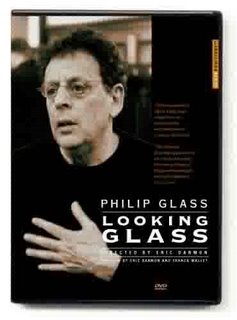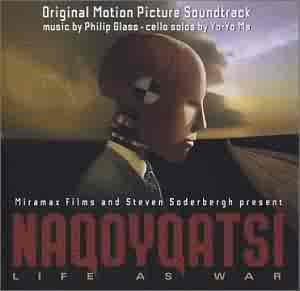 is a monster. But we'll get to that. Let me share some things first.
is a monster. But we'll get to that. Let me share some things first.For any serious listener, even if you do not like Glass' music, there are two essentials: First, download the Philip Glass interview conducted by Ira Glass (host of This American Life) from Fresh Air's website. This interview is funny, insightful and if you write music, Glass will open your mind and his observations on music will change your creative life.
I have tried, in vain, to get my set-in-their-ways twenty-something students to listen to this interview, but like the rest of the music world, they are already well on their way to being close-minded. It's a shame because they are so young, yet they have shut down an essential process in a creative life: reinventing yourself, questioning tried and true methods of operation, staying open to your creative instincts and a willingness to abandon everything you have learned in order to discover something new.
The second essential is this documentary Philip Glass: Looking Glass, directed by Eric Darmon. From the minute this documentary on composer Philip Glass begins, it's apparent that we are in for a treat. We hear Glass talking on the phone as the camera focuses on various photographs, art works, music scores, scattered around his New York apartment. This is look into the private life of this incredibly busy composer. The film follows Glass around NY, Paris and London. Mixed in are interviews which contain recollections about his early years, his formal studies and we even watch Glass working on a score. A great DVD for sure, but a bit short coming in at 103 minutes. Bonus features include a Glass interview and performance.
 Then there's that whole Glass as "water torture" (lovingly described by someone) reaction from traditional classical audiences.Glass tells us that "the world is far more conservative than you can ever imagine" as he recalls the days when he had to play in lofts and art galleries because the traditional concert hall crowd was "terrified of amplified music." Taking refuge so to speak in galleries, he reveals that "in the world of art, innovation is accepted and welcomed" but in music, that is not the case.
Then there's that whole Glass as "water torture" (lovingly described by someone) reaction from traditional classical audiences.Glass tells us that "the world is far more conservative than you can ever imagine" as he recalls the days when he had to play in lofts and art galleries because the traditional concert hall crowd was "terrified of amplified music." Taking refuge so to speak in galleries, he reveals that "in the world of art, innovation is accepted and welcomed" but in music, that is not the case.
Mention Philip Glass to your average classical listener and you'd think that you were talking about the Devil himself. Like he's some kind of beastly monster hell bent on the destruction of Western civilization, beginning with music. Glass (and his contemporary Steve Reich) have to be at the top of the list of contemporary composers most reviled. At one concert, Glass has recalled that tomatoes have been thrown in protest and even struck a few of those on stage. As he slyly states, "You don't bring tomatoes to a concert unless you plan to throw them." Why then pay money for a ticket? Because, to some people, their taste in music is more important than behaving in a civilized manner. Which, ironically, an appreciation of classical music is supposed to be a reflection of being civilized. An irony evidently lost on the classical set.
Glass recalls a time when he and other contemporaries were regarded by the more traditional composers as “primitives”. One time he showed some of his scores to another composer at a radio station in Germany. Although Glass was 31 at the time and had graduated from Julliard and his studies with Nadia Boulanger, the other composer puzzled over the music for a while and then let out this remark: “Have you ever considered going to music school?” Always gracious and with good humor, Glass says that he let this remark go and thanked the man for looking at his music. Glass’ confidence in his chosen path is unshakeable. I admire that.
Even terrible reviews don’t bother Glass and his ensemble. He has stated that “most are hilarious and the ones that review favorably don’t go far enough.” How has he not only survived, but thrived in an environment that is clearly narrow-minded, conservative to the extreme and clearly quite hostile to Glass’ music? In some ways, he has done an “end-run” around the usual classical channels by first engaging the art, dance and writer’s communities. He made his own gigs, in other words. It was only after touring and promoting his music through nontraditional venues that eventually he got commissions to write symphonies, concertos and the usual formats of the symphony orchestra. He is a man who deserves our admiration, even if only for never giving up and keeping to his dreams.
While I would count myself among Glass' audience, and he has truly brought something new to classical music, I sometimes wonder now if he isn't just repeating himself. The Glass style is the most easily recognizable in the world of music right now. But that’s the problem, he always sounds like Philip Glass. Symphonies, string quartets, you name it-always the same way of organizing music. He once said that young composers copy everybody else until he/she finds their own voice, but once you find it, Glass says “It’s hard to get rid of the damn thing.” He has fallen into his own formula without intending to. I like it when he breaks free, like the marvelous Aguas de Amazonia with the Brazilian ensemble Uakti. One time after about a nine minute piece from Glass’s Naqoyqatsi (A piece used in a national PBS promo. Ok for them but not us, yes? ), a lady called me. She asked me why I was playing Philip Glass. I said that I liked the music. She suggested that I might have hit my head too hard against a wall or something to come to that conclusion. I was in a good mood that day and humor was my best friend because I actually laughed at her rather insulting remark. I then asked her:
One time after about a nine minute piece from Glass’s Naqoyqatsi (A piece used in a national PBS promo. Ok for them but not us, yes? ), a lady called me. She asked me why I was playing Philip Glass. I said that I liked the music. She suggested that I might have hit my head too hard against a wall or something to come to that conclusion. I was in a good mood that day and humor was my best friend because I actually laughed at her rather insulting remark. I then asked her:
“M’am, do you like rock music?”
“No, I’m afraid I’m too old for that.”
“Do you like Indian music like Ravi Shankar?”
“No, can’t say I do.”
“Then that’s why you don’t like Philip Glass.”
There’s no way I convinced her of anything and soon the call ended. But it won’t end there. Never. Nope. No way. I’m always going to hear about it when I cross the line into contemporary territory and it is in my nature to explore the world of music. Can’t help it. I’m just made that way.
Sometimes, after a particularly insulting email or phone call, I laugh and think about what poor old Phil Glass went through. No one has ever thrown a tomato at me.
At least, not yet.

7 comments:
Philip Glass.
Classical.
Philip Glass.
Classical.
Philip Glass.
Classical.
I'm having trouble. Hasn't he written all his music in the last forty years?
Classical is being used in just a general way. Doesn't sound like Hayden or mozart to me either.
And then there are some of us listeners who do a small dance of delight (or would if we weren't in traffic) when you play a Steve Reich piece.
We're not weird. We're . . . elite. Yeah.
(Oh, I might get lucky and come across an excerpt of Einstein on the Beach on WRCT, here. But as with most freeform radio stations, it's, well, freeform and frequently subject to the whims of the random automation system when the student djs don't show up.)
Your site is great. Very well laid out-so clean.
Thanks! (I assume you mean my portfolio site which I can take actual credit for, as opposed to my blog which is merely a severely customized layout offered by livejournal?)
I hadn't gotten that far, but a quick glance reveals delights. Thanks.
I think Philip Glass is the greatest composer of the last 100 years. It doesn't all sound the same if you really listen to it. BTW, Glass is a buddhist, although he rarely states it in music interviews- you have to look in books about american buddhists. It explains everything- his pieces are meditations.
Post a Comment